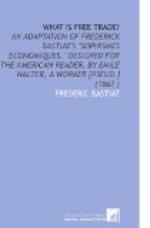Let us see, then, if the two opposite principles I have laid down do not predominate, each in its turn; the one in practical industry, the other in industrial legislation. When a man prefers a good plough to a bad one; when he improves the quality of his manures; when, to loosen his soil, he substitutes as much as possible the action of the atmosphere for that of the hoe or the harrow; when he calls to his aid every improvement that science and experience have revealed, he has, and can have, but one object, viz., to diminish the proportion of the effort to the result. We have indeed no other means of judging of the success of an agriculturist or of the merits of his system, but by observing how far he has succeeded in lessening the one, while he increases the other; and as all the farmers in the world act upon this principle, we may say that all mankind are seeking, no doubt for their own advantage, to obtain at the lowest price, bread, or whatever other article of produce they may need, always diminishing the effort necessary for obtaining any given quantity thereof.
This incontestable tendency of human nature, once proved, would, one might suppose, be sufficient to point out the true principle to the legislator, and to show him how he ought to assist industry (if indeed it is any part of his business to assist it at all), for it would be absurd to say that the laws of men should operate in an inverse ratio from those of Providence.
Yet we have heard members of Congress exclaim, “I do not understand this theory of cheapness; I would rather see bread dear, and work more abundant.” And consequently these gentlemen vote in favor of legislative measures whose effect is to shackle and impede commerce, precisely because by so doing we are prevented from procuring indirectly, and at low price, what direct production can only furnish more expensively.
Now it is very evident that the system of Mr. So-and-so, the Congressman, is directly opposed to that of Mr. So-and-so, the agriculturist. Were he consistent with himself, he would as legislator vote against all restriction; or else as farmer, he would practise in his fields the same principle which he proclaims in the public councils. We would then see him sowing his grain in his most sterile fields, because he would thus succeed in laboring much, to obtain little. We would see him forbidding the use of the plough, because he could, by scratching up the soil with his nails, fully gratify his double wish of “dear bread and abundant labor.”
Restriction has for its avowed object and acknowledged effect, the augmentation of labor. And again, equally avowed and acknowledged, its object and effect are, the increase of prices—a synonymous term for scarcity of produce. Pushed then to its greatest extreme, it is pure Sisyphism as we have defined it; labor infinite; result nothing.




